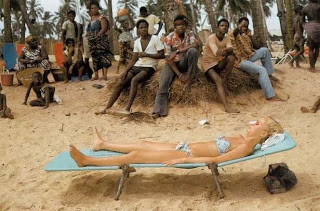By Sabrina Grape
After moving back from Prague to Bremen, Germany, to finish my Bachelor in Leisure Science, I also changed from intern at the IYNF office to Naturefriends’ e-volunteer. As such, I am continuing my series of articles on the topic of Green Travelling.
Tourism is growing and especially in developing countries it often makes a big part of the export earnings. It can account for up to 25% of the GDP in some states.

For tourists, those countries, may it be in Asia, Africa or South America, often create a special fascination. Mystic cultural rituals, ancient traditions, simple life and apparently untouched nature are part of the picture many people have in their mind when thinking of a vacation in Ecuador, Nepal or the Maldives.
This is definitely a part of it and it would be great if it could be conserved! It is every traveller’s task to contribute to it. So also YOUR TASK!
Tourism can threaten the treasures, many poor countries possess, in various ways.
Mass tourism can harm the soil, vegetation and fauna with its infrastructure, like hotels, leisure centers or big roads, pollution from cars and tourism supporting industry, and high water consumption. Wonderful landscapes are often destroyed by big accommodation structures or highways built within huge and rich ecosystems. This interaction leads to the destruction of habitat and the endangerment or even extinction of rare and important species.

Especially developing countries are often victims of big international companies. They take over all the economy of the country, exploiting the resources and leaving no benefits for the local community behind. Around 80% of the money generated by tourism in the Caribbean is estimated to leak out of the destination to foreign companies. In Thailand it is supposed to be 70 and and in India 40 Percent of the tourists’ money spent on the vacation that does not stay in the country.
While lobbies often claim that tourism is bringing wealth to the visited countries, the sad truth is the opposite: Not only lots of the money is leaving the destination, but costs for infrastructure and services are often the responsibility of the local government. This means for example that the government has to pay for highways, airports, waste disposal and other maintenance work, which in the end has to be financed through higher taxes and prices for the local community. In many areas that face water shortage, the situation is worsening, not only because of the effects of climate change but also because of the increasing consumption of drinking water for hotels, their swimming pools, laundries and so on.
One might say that at least, tourism is offering jobs to the local population. And yes, it could – but unfortunately many companies decide to recruit their employees from abroad. Either because it is cheaper or because they can find more qualified staff there. Only very few invest in education and training of young locals.
However, this does not mean that you should not go on holidays in a developing country. On the contrary, if tourism is carried out in a sustainable way, it can indeed help the local community and economy.
In general, it is good when money from abroad is entering the local market – as long as it stays there. Therefore, pay attention to where you spend your money. If it is for food, be sure that you buy local products from a local store. Don’t go to the next supermarket and buy the brand of biscuits that you know from home, just because you know you will like it. Be adventurous and try something new. You can probably find delicious things when you go to a bakery and try the freshly made sweets there.

The same for souvenirs – in many places you can find handcraft shops owned by locals where you can find authentic gifts for your friends and family – or for yourself! Only be sure that you are not buying anything made from endangered species.

Also if you want to do a guided tour in a National Park or attend a workshop about cultural traditions, typical cooking or dancing, this is a perfect opportunity to not only support the local economy but also gives value to the natural and cultural resources of the area. By giving economic value to nature and culture, their conservation becomes a priority and a job opportunity, which then contributes to environmental and cultural education and awareness.
So when you book your vacation in a developing country, try to find a nice small accommodation run by locals. These are often less expensive and offer you a completely different view into culture and habits in the destination. Consider if you really need an all-inclusive holiday resort or if it is not a lot more exciting to be spontaneous, eat local food in small restaurants, discover the surroundings with a local guide and find out more about the traditions and culture.

This is somthing you should avoid – respect local rules!
As always, but especially where locals might see you as the “privileged rich person from the West”, it is important to show respect and to accept people as they are with their culture. It might be a good idea to find out about social rules in the destination beforehand, if you are planning to get in closer contact with locals. Like this you avoid traps. If you are not sure about something, watch others or ask – interesting conversations can develope!
